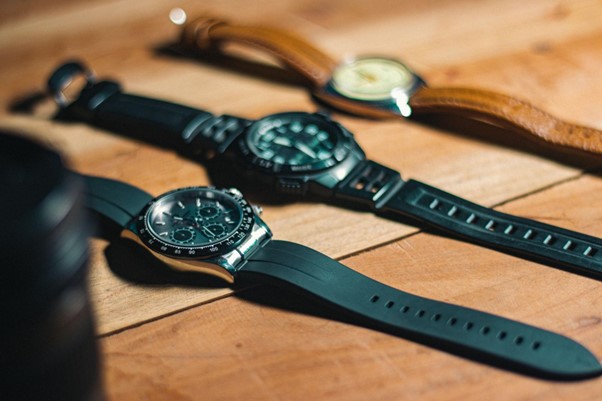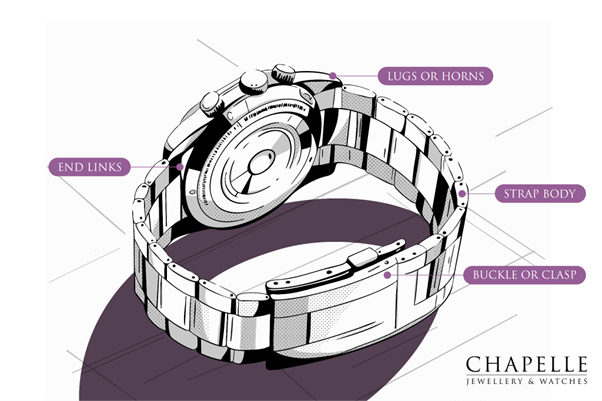Your Ultimate Guide to Watch Strap Types
Posted on: 03/04/2025
When deciding which watch to buy, it's not just about the timepiece itself. The strap plays an essential role in both the style and comfort of the watch. Whether you're new to watches or a seasoned collector, understanding the different types of watch straps can help you make the best choice for both your personal style and functional needs.
In this guide, we’ll break down the most popular types of watch straps and their components, as well as the pros and cons of each. We’ll cover:
●
The parts of a watch strap
●
Types of watch strap clasps
○
Buckle clasps
○
Deployant clasps
○
Push-button clasps
●
Types of watch strap materials
○
Leather watch straps
○
Types of leather watch straps
○
Metal watch straps
○
Metal watch strap types
○
Rubber and silicone watch straps
●
Watch bracelet types: finding your watch strap style
○
Oyster bracelets
○
Jubilee bracelets
○
Mesh bracelets
● Which brands make the best watch straps?
The parts of a watch strap
Before diving into the various materials and styles
seen in watch straps, it’s important to understand the basic watch strap parts.
The strap of a standard watch typically includes the following components:
- Strap body: The main length of the
strap that wraps around your wrist. This is usually made of materials such
as leather, metal, or rubber.
- Buckle or clasp: The fastener used to secure the strap around
your wrist. There are different types of clasps, which we cover in more
detail below.
- Lugs or horns: These are the small extensions at the case (the
metal part covering the watch’s face) where the strap is attached. These
can vary in shape and size depending on the watch.
- End links: On metal straps, these are the pieces at the end of
each link that connect the strap to the watch case. They fit between the
lugs.
- Keepers: Small loops that keep any
excess strap tucked in after fastening the watch — this is most commonly
found on a leather strap. Keepers may be fixed in place, or be able to
slide up and down.
To make it easier to visualise, we’ve put together a diagram labelling each of the different components:

Types
of watch strap clasps
The clasp is an essential component that ensures the
strap stays fastened around your wrist. There are several types of clasps
available, each with its own set of benefits.
Buckle clasps
The buckle clasp is the most traditional clasp type and
is usually found on leather, fabric, and some rubber straps.
Pros:
●
Simple and easy to use
●
Provides an adjustable fit
Cons:
●
May not be as secure as other clasps, particularly for
those who prefer a more robust closure
●
Can wear away at the holes in a leather strap over time
Deployant clasps
A deployant clasp is often used on metal bracelet
watches and features a folding mechanism that allows the strap to remain
securely fastened.
Pros:
●
More secure than a traditional buckle clasp
●
Provides a polished, sleek look
Cons:
●
Can be more expensive and less adjustable than a simple
buckle
Push-button clasp
The push-button clasp is a more advanced version of the
deployant clasp and includes a button mechanism for added security.
Pros:
●
Extremely secure and unlikely to open accidentally
●
Ideal for larger, heavier watches
Cons:
●
Can be difficult to adjust and may require more
maintenance
Types of watch strap materials
Now that we’ve covered the parts of a watch strap, let’s
take a closer look at some of the most common types of straps. The material you
choose for your strap can impact both its appearance and how comfortable it
feels on your wrist. Here’s an overview of the most popular materials used and
the pros and cons of each.
Leather watch straps
Pros:
●
Classic,
timeless aesthetic: Leather straps exude sophistication and are a go-to
choice for formal and business settings.
●
Comfortable fit:
Leather softens over time, adapting to the shape of your wrist, making it an
incredibly comfortable choice for a strap.
●
Versatility:
Leather is suitable for a wide range of occasions, from casual to formal,
adding a touch of class to any timepiece.
Cons:
●
Maintenance:
Leather is susceptible to wear from water, sweat, and UV exposure. It requires
regular care, including conditioning and cleaning, to prevent cracking and
fading.
●
Limited
Durability: Leather straps aren’t as durable as other materials and can
degrade more quickly with frequent use.
Types of leather
watch straps
When it comes to leather watch straps, there are
several variations offering different looks and features:
●
Full-grain
leather: Known for its natural texture and premium feel, full-grain leather
is considered the highest quality. It ages beautifully, developing a unique
patina over time.
●
Top-grain
leather: Slightly less expensive than full-grain leather, top-grain leather
has a smooth finish and is also durable, but it doesn’t develop the same unique
patina.
●
Genuine Leather:
Made from the layers beneath the top grain, genuine leather is a more
affordable option but tends to be less durable and has a less refined finish.
●
Nubuck leather:
Also known as suede, nubuck leather has a soft, velvety texture, but it
requires more care to maintain its appearance as it’s prone to staining.
●
Faux Leather:
An affordable, vegetarian alternative to traditional leather, faux leather
offers a similar appearance but can be easier to maintain than some leathers.
While it doesn't develop the same patina as natural leather, it's often more
resistant to weather conditions and wear.
Metal watch straps
Pros:
●
Durable:
Metal straps, such as those made from stainless steel, titanium, and gold, are
known for their longevity and resistance to wear and tear.
●
Low maintenance:
Unlike leather, metal straps don’t require as much upkeep. A quick wipe-down is
typically all they need to keep looking shiny and new.
●
High-end appeal:
The sleek, shiny finish of metal straps adds a luxurious feel to any watch,
making them perfect for formal and professional settings.
●
Match with your jewellery: Whether you prefer yellow gold, silver, or stainless steel, matching your watch strap
with your jewellery colour of choice creates a cohesive look.
Cons:
●
Weight:
Metal straps can add considerable weight to your watch, making them less
comfortable for some wearers.
●
Less flexibility:
Metal bands are generally less flexible than leather or rubber straps, which
can impact comfort, especially during extended wear.
●
Cold and hot
sensitivity: Metal can quickly absorb the temperature of your environment,
which may be uncomfortable in extreme weather conditions.
Metal watch strap types
When we talk about metal watch strap types, we refer to
the various materials and designs commonly used in the construction of metal
bracelets. Here are a few popular ones:
●
Stainless steel:
This is the most common metal strap type, known for its strength, corrosion
resistance, and sleek appearance. It’s a go-to choice for both luxury and
everyday watches.
●
Titanium: A
lightweight and highly durable alternative to stainless steel, titanium straps
are strong without feeling heavy. They’re often waterproof, making them perfect
for diver’s watches.
●
Gold:
Watches with gold-tone straps — whether yellow, rose, or white gold — are often seen in high-end luxury
watches. These straps add a sophisticated and opulent look to any timepiece.
●
Silver alloy:
Silver alloy straps are made by combining silver with other metals like copper
or nickel to enhance durability. These straps are an excellent choice for those
who prefer the cool, lustrous finish of silver but require added strength and
resistance to wear.
Rubber and silicone
watch straps
Pros:
●
Flexible and
comfortable: Rubber or silicone straps are highly flexible, soft, and
comfortable to wear, especially for outdoor or sports enthusiasts.
●
Water-resistant:
These materials are perfect for water-based activities as they are resistant to
moisture and salt.
●
Low maintenance:
Rubber and silicone straps are easy to clean and maintain, making them a
practical choice for daily wear.
Cons:
●
Less elegant:
While practical, rubber straps are often viewed as less elegant and may not
suit formal occasions or business settings.
●
Wear over time:
Rubber can degrade over time, especially if exposed to direct sunlight, which
can cause it to crack or lose its colour.
Watch bracelet types: finding your watch strap
style
Much like a piece of jewellery,
your style preferences are key when it comes to choosing the perfect watch
strap. You want a strap that complements both your wrist and your wardrobe,
while also fitting your lifestyle. Whether you lean toward timeless elegance,
sporty sophistication, or minimalist design, there’s a watch strap for you that
will make a statement.
Oyster bracelets
The oyster bracelet is an iconic design, known for its
durability and timeless appeal. Its interlocking links provide sturdiness while
maintaining a streamlined, polished look. Popular in men’s watches, the oyster design is typically
found on a metal strap, though it can also be featured on other types of bands.
Jubilee bracelets
Another of the most common watch bracelet types is the
jubilee bracelet. Featuring an intricate five-piece link design, this bracelet
combines elegance with flexibility, providing a comfortable fit while
maintaining a high-end look. The jubilee is a classic watch strap style often
associated with luxury watch brands. Again, it’s most often seen on
metal bracelets, and looks equally stylish in gold, rose gold, or silver tones.
Mesh bracelets
Mesh bracelets are often made from stainless steel wires, weaved together to
create a characteristic woven look. While remaining sturdy, these bracelet link
types have an elegant, delicate feel, making them a popular choice for women’s watches.
Which brands make the best watch straps?
Many well-respected watch brands offer a wide variety of
straps, from durable metal links to luxurious leather finishes. CASIO is renowned for its practicality, with
durable rubber and classic metal strap options that work with all lifestyles. Citizen’s collection features leather and
metal straps, with a focus on innovative technologies like Eco-Drive and
solar-powered watches. Seiko is a trusted brand known for its
precision and craftsmanship, offering a range of watch strap types that combine
both functionality and elegance.
In addition, Chapelle Jewellers also offers a selection
of designer watches from brands like Emporio Armani, Calvin Klein, and Michael Kors. These luxury labels bring a
touch of sophistication and elegance to your wrist, with straps that range from
sleek and modern bracelets to classic designs.
The right watch strap can elevate your timepiece from a simple accessory to a style statement, perfectly complementing your wardrobe and ensuring comfort throughout the day, no matter your lifestyle. We hope this guide has helped you understand the different options available and brought you one step closer to finding the ideal strap for your needs.
At Chapelle, we offer an incredible range of watches and jewellery, all with at least 30% off the recommended retail price, so you can always find your perfect piece for less. Shop our collection today to discover your newest addition, from engagement rings to necklaces and earrings, as well as a fantastic selection of gifts.
